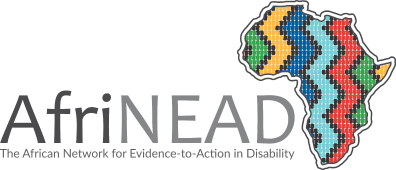AfriNEAD
About usSince 2007
Ensuring that networking and research contribute to a better quality of life for people with disabilities in Africa
Background
Despite a supportive policy framework at international and national levels in many African countries, and a large amount of existing and new research on issues relating to the overall improvement of quality of life for people with disabilities in Africa, the extent of meaningful change in the actual quality of life, health, access to equal rights, decent work and full community integration for disabled people throughout Africa remains limited.
It is therefore clear that research and policy developments are not yet significantly impacting to create real outputs in order to realize a truly inclusive society. A comprehensive and integrated approach that links prevention, rehabilitation, empowerment and education strategies with steps to change attitudes is required. AFRINEAD intends to be part of this solution through ongoing dialogue with all stakeholders using disability research evidence as a tool to facilitate this dialogue.
Our Objectives
- Networking between DPO’s, academics, researchers, and the intended audiences for the research (e.g., policymakers, civil society, business) throughout the African continent.
- Coordinating and translating research findings into useable and accessible formats for different intended audiences.
- Facilitating information-sharing and reviewing, as well as monitoring and evaluation.
- Facilitating dialogue between all stakeholders in the disability debate, thus helping to keep the disability debate alive in Africa.
- Establishing Disability Research Country Working Groups (DRCWGs) tasked with producing in country research evidence that will assist in disability policy formation/inclusion of disability issues in existing policies.
- DRCWGs will identify action pathways and produce Best Evidence-to-Action Practice Guidelines for their countries which would be published on the AfriNEAD webpage.
- Assisting member countries to develop a methodology for profiling their own local situation regarding disabled people, the services available to them, the research being conducted and areas needing investigation, and to identify facilitators and barriers for turning evidence to action. These profiles will be published in an e-book on the AfriNEAD webpage.
- Facilitating a triannual Africa-wide symposium focusing on a particular issue of interest in order to assess progress on evidence-to-action, consolidate and take the debate forward.
- Each event will produce a unique and stimulating collection of papers to be published as a Special Issue of a suitable international journal.
- Bridge the gap between academics, Government, business, and the needs of the disabled community.
ACHIEVEMENTS OF AFRINEAD
The development of the network that celebrated 10 years in 2017 and has more than 1000 e-mail addresses that receive quarterly newsletter about the network.

The tabling of the 6 conferences 2 in Cape Town and the other 1 in Zimbabwe, 1 in Malawi with the 5th in Ghana 2017, and the 6th one was again in Cape Town, virtually in 2020


The development of the African journal for Disability and its achievements. AJODajod.org

